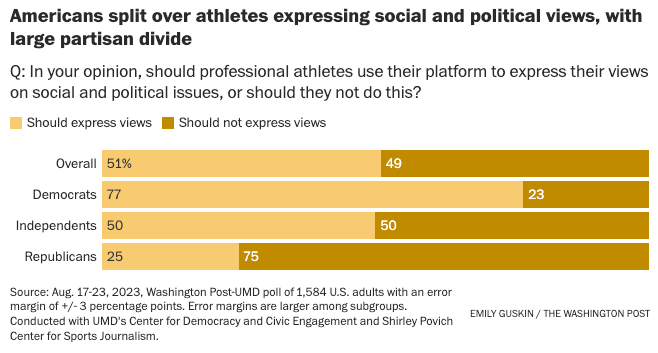UMD-Washington Post Poll shows athletes’ advocacy for voting rights garners broad support
CDCE's poll with The Shirley Povich Center for Sports Journalism and The Washington Post generated important findings for our democracy by mobilizing interdisciplinary expertise from across UMD.
Dear Friends,
At CDCE, we are always focused on mobilizing the whole UMD community to strengthen democracy. Our ongoing partnership with The Shirley Povich Center for Sports Journalism at UMD’s Philip Merrill College of Journalism to study the intersection of sports and politics is a great example of how mobilizing expertise from across the University of Maryland can generate important new insights that strengthen American democracy.
Today, we’re excited to share the results of a new poll CDCE and the Povich Center conducted with The Washington Post covering a wide range of issues at the intersection of sports and politics. The poll found that most Americans support pro athletes leading efforts to promote voting rights.
This finding has significant implications for the upcoming 2024 elections. Many athletes and teams are thinking about engaging with the election but could be worried about alienating potential fans. These data show that the path forward for them might be through nonpartisan efforts to encourage registration and voting.
Americans split on athletes sharing political views.
We have also been working in partnership with Povich Center Director Mark Hyman and GVPT Professor and CDCE Research Scholar Chryl Laird to make sense of the poll results showing that Americans are split - with large partisan and racial differences - on whether athletes should use their platform to express social and political views.
Hyman commented on the poll results in Maryland Today:
The poll tells us that advocacy of social and political causes by pro athletes remains a divisive issue. What some see as an athlete taking a principled stand others may interpret as pushing a personal agenda. That won’t deter some athletes from using their voices. But it can—and often does—come at a cost.
Laird situated the results in the broader context of the intersection of sports and racial segregation in the United States.
The removal of the color line and segregation from sports has significantly increased the racial diversity of athletes at the professional level. As this diversification has happened, white people are more inclined to view athletes opening up about their political views or championing the franchise as a far step away from the responsibilities of an athlete, which is to shut up and play.
We are excited to continue working with colleagues across UMD to explore the intersection of sports and politics.
In the coming weeks, we will continue working with our colleagues at The Washington Post and the Povich Center to share other key findings from this poll. We also are working on new efforts with sports teams and local election officials building on our work evaluating the use of stadiums as polling sites during the 2020 election. These efforts include both new research projects and convening learning communities where practitioners and scholars can build shared knowledge at the intersection of sports and politics.
Please reach out if you or someone you know are interested in learning more about our work on sports and politics and contributing new expertise. There are so many incredible UMD scholars, students and community partners who could help contribute in amazing ways to strengthen democracy for all.
Sincerely,
Mike Hanmer, Director, Center for Democracy and Civic Engagement
Sam Novey, Chief Strategist, Center for Democracy and Civic Engagement






